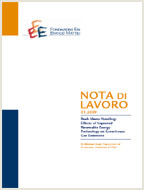Saving Rate Dynamics in the Neoclassical Growth Model – Hyperbolic Discounting and Observational Equivalence

03.05.2013
Hossein Farzin, Ronald Wendner
D91, E21, O40
Saving Rate, Non-Monotonic Transition Path, Hyperbolic Discounting, Regular Discounting, Commitment, Short Planning Horizon, Neoclassical Growth Model
Climate Change and Sustainable Development
Carlo Carraro
The standard neoclassical growth model with Cobb-Douglas production predicts a monotonically declining saving rate, when reasonably calibrated. Ample empirical evidence, however, shows that the transition path of a country’s saving rate exhibits a rising or non-monotonic pattern. In important cases, hyperbolic discounting, which is empirically strongly supported, implies transitional dynamics of the saving rate that accords well with empirical evidence. This holds true even in a growth model with Cobb-Douglas production technology. We also identify the cases where hyperbolic discounting is observationally equivalent to exponential discounting. In those cases, hyperbolic discounting does not affect the saving rate dynamics. Numerical simulations employing a generalized class of hyperbolic discounting functions that we term regular discounting functions support the results.
